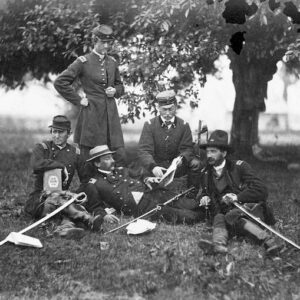Tag: Von Zeppelin (Ferdinand H. A. G.)
 Wikipedia says: Ferdinand Adolf Heinrich August Graf von Zeppelin (8 July 1838 – 8 March 1917) was a German general and later inventor of the Zeppelin rigid airships; he founded the company Luftschiffbau Zeppelin.
Wikipedia says: Ferdinand Adolf Heinrich August Graf von Zeppelin (8 July 1838 – 8 March 1917) was a German general and later inventor of the Zeppelin rigid airships; he founded the company Luftschiffbau Zeppelin.
Ferdinand was the scion of a noble family. Zeppelin, the family’s eponymous hometown, is a small community outside the town of Bützow in Mecklenburg.
Ferdinand was the son of Württemberg Minister and Hofmarschall Friedrich Jerôme Wilhelm Karl Graf von Zeppelin (1807–1886) and his wife Amélie Françoise Pauline (born Macaire d’Hogguer) (1816–1852). Ferdinand spent his childhood with his sister and brother at their Girsberg manor near Konstanz, where he was educated by private tutors and lived there until his death. On 7 August 1869 Ferdinand married Isabella Freiin von Wolff in Berlin. She was from the house of Alt-Schwanenburg (present day — Gulbene town in Latvia, then part of Livonia). They had a daughter, Helene (Hella) von Zeppelin (1879–1967) who in 1909 married Alexander Graf von Brandenstein-Zeppelin (1881–1949).
Ferdinand had a nephew Baron Max von Gemmingen who was to later volunteer at the start of World War I, after he was past military age, to become general staff officer assigned to the military airship LZ 12 Sachsen.
In 1853 Count Zeppelin left to attend the polytechnic at Stuttgart, and in 1855 he became a cadet of the military school at Ludwigsburg and then started his career as an army officer in the army of Württemberg.
By 1858, Zeppelin had been promoted to lieutenant, and that year he was given leave to study science, engineering and chemistry at Tübingen. The Prussians’ mobilising for the Austro-Sardinian War interrupted this study in 1859 when he was called up to the Ingenieurkorps (Prussian engineering corps) at Ulm.
In 1863 Zeppelin took leave to act as an observer for the Union’s Army of the Potomac in the American Civil War in Virginia. Later, he travelled to the Upper Midwest with a party that probably included two Russians. Led by Native American (probably Ojibwe) guides, they canoed and portaged from the western end of Lake Superior up the St. Louis River and across to Crow Wing, Minnesota, on the Upper Mississippi River. On reaching St. Paul (via stagecoach and hired carriage), Zeppelin encountered German-born itinerant balloonist John Steiner and made his first aerial ascent with him from a site near the International Hotel in downtown St. Paul on 19 August. Many years later he attributed the beginning of his thinking about dirigible lighter-than-air craft to this experience.
In 1865 Zeppelin was appointed adjutant of the King of Württemberg and as general staff officer participated in the Austro-Prussian War of 1866. He was awarded the Ritterkreuz (Knight’s Cross) of the Order of Distinguished Service of Württemberg. In the Franco-Prussian War of 1870–1871 a reconnaissance mission behind enemy lines, during which he narrowly avoided capture, made him famous among Germans.
From 1882 until 1885 Zeppelin was commander of the 19th Uhlans in Ulm, and was then appointed to be the envoy of Württemberg in Berlin. In 1890 he gave up this post to return to army service, being given command of a Prussian cavalry brigade. His handling of this at the 1890 autumn manoeuvres was severely criticised and he was forced to retire from the Army, albeit with the rank of generalleutnant.
Showing the single result
